TrendForce hosted the Micro
LED Forum 2022 seminar at the NTUH International Convention Center on September 13th. Well-known industry experts were invited to the event to discuss the current trends in the development of the Micro LED industry. Their lectures covered a wide range of related topics such as epi-wafers, mass transfer, backplane technologies, equipment development, and market applications. On the whole, this year’s Micro LED Forum revolved around two themes or product categories: large-sized Micro LED displays and Micro LED AR micro displays. These two product categories were thoroughly examined with respect to technological advances and application development. This article focuses on Micro LED AR micro displays and their use in the creation of the Metaverse. The content below thus gives readers an understanding of some of the valuable market intelligence that was presented by the lecturers.
Trends in Market for Next-Generation Display Technologies During 2022
Speaker: Eric Chiou
Senior Research VP / TrendForce
TrendForce’s Senior Research VP Eric Chiou said large-sized Micro LED displays continue to undergo technological improvement and cost optimization. At the same time, the global electronics brands have been very proactive in the development of products featuring Micro LED. Hence, there is a chance of an accelerated commercialization process for Micro LED displays. Chiou also said the development of this kind of product in the near future will take on two major paths. Regarding commercial applications, large-sized Micro LED displays will likely be purposed for cinema screens deployed at movie theaters and video walls deployed at public venues. Turning to consumer-related applications, large-sized Micro LED displays will be mainly used for home theater TVs.
Currently, production cost remains high for Micro LED displays. However, the gradual technological maturation of the related manufacturing equipment and components will eventually make large-size Micro LED displays the first choice in the high-end segment of the whole display market. Chiou added that the outlook on the adoption of Micro LED for transparent AR glasses is quite positive. Going forward, optical (light) engines and related solutions featuring Micro LED are expected to keep improving. Also, when technologies advance to a certain level and costs drop to a sweet spot, Micro LED will have an opportunity to extend from the very niche application segments such as military, medicine, and aerospace to the much wider application segments concerning consumers and enterprises.
High-Performance AR Glasses with Customized Micro LED Display, Advanced Processor, and Special Software Algorithm
Speaker: Kelly Peng
Co-Founder, CEO, CTO / Kura Technologies
Kelly Peng from Kura Technologies gave her seminar presentation online due to the pandemic-related restrictions. She discussed the experience that her company has gained with the development of a wearable Micro LED AR smart glasses. She also introduced the Kura Gallium, which is her company’s first commercial product in the AR glasses category. The Kura Gallium won the 2022 CES Innovation Award as it was recognized to have significantly surpassed many other AR headgears with respect to performance and specifications (e.g., viewing angle, transparency, appearance design, resolution, brightness, and depth of field). While offerings from competitors can attain a viewing angle of up to 52 degrees, the Kura Gallium can reach up to 150 degrees. Also, the Kura Gallium has a transparency of 25%, compared with the maximum of 25% attained by competitors’ products. All in all, the Kura Gallium is able to more faithfully replicate the actual environment and deliver AR images of high quality. Moreover, with a weight of just 80 grams, it achieves 8K resolution and unparalleled brightness. Such level of performance represents a major breakthrough for the adoption of AR glasses for applications such as remote training and medical services.
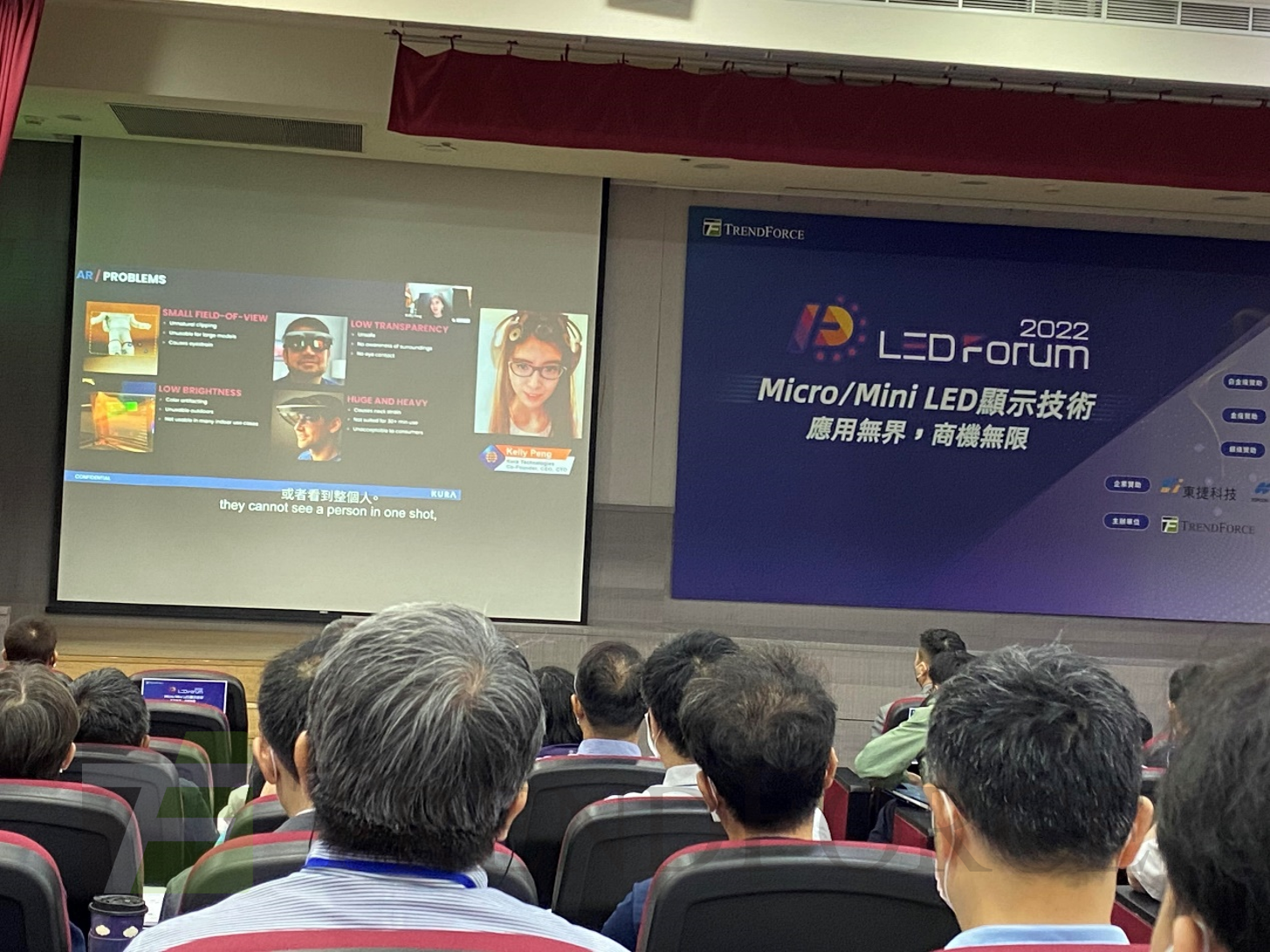
AR Experience and Smart Glasses
Speaker: Daniel Lee
CTO of ROA (Rest of Asia) / ams-OSRAM
On the topic of AR smart glasses, Daniel Lee from ams-OSRAM provides an analysis from the perspective of a light source provider. His presentation covered market segmentation, specification standards for certain applications, and technological challenges. In particular, he noted the differences between Micro LED micro projection and LBS display. Furthermore, he discussed how the “New MOSAIC + LCOS/DLP” solution from ams-OSRAM can be adopted in various industrial and professional fields. The optical engine of this solution can be scaled down to within 5cc, thus meeting the design requirements for thinner, smaller, and lighter AR glasses. Micro LED micro projection could compete against LBS display in the future because using RGB laser as a light source will also entail further optical optimization in order to minimize mutual interference. Using Micro LED as a light source will avoid this problem because the design is fundamentally different.
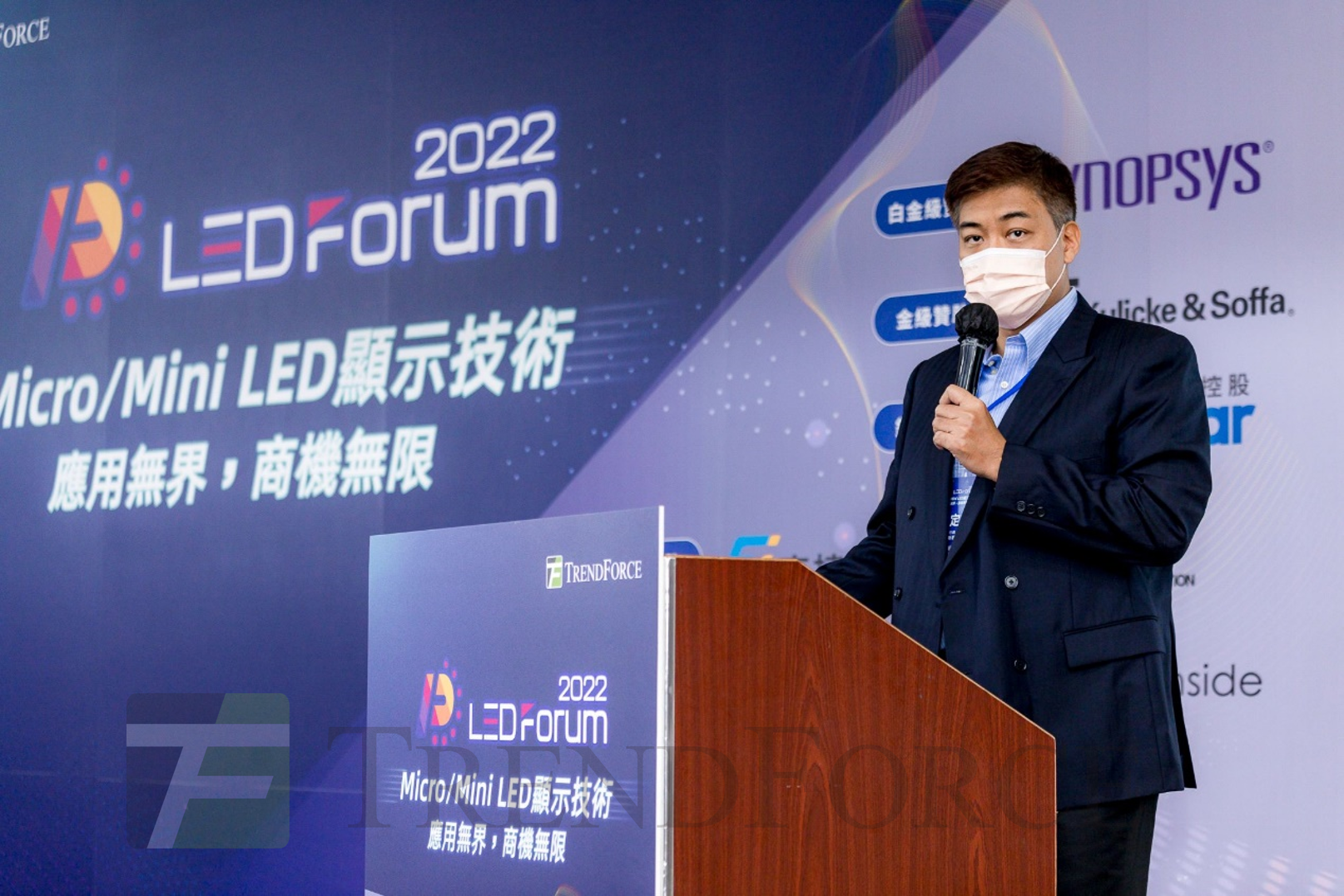
A Micro LED AR Micro Display and Its Applications
Speaker: Dr. Xu Hui-wen
COO / Jade Bird Display (JBD)
Dr. Xu Hui-wen said in the field of Micro LED optical engines, JBD in recent years has been putting a lot of efforts into the development of monochrome and polychrome solutions for transparent AR smart glasses. This year, JBD has announced a major investment in a new production plant, strategic cooperation agreements with numerous manufacturers for optical waveguide components, and critical technological breakthroughs. Regarding its monochrome optical engines, the green Micro LED chips can achieve a brightness level that exceeds 5 million units, while the brightness levels of the blue and red Micro LED chips can also reach 500,000 nits. As for its polychrome optical engines, the in-house developed “X-cube” solution enables transparent full-color display for AR smart glasses. For a 0.13-inch AR display, the polychrome optical engine has been scaled down to 0.85cc while maintaining a luminous power level of 4-5lm. This translates to around 5lm/cc. JBD will be releasing products with these specifications in 2023 in the hope of entering the enterprise and consumer market segments.
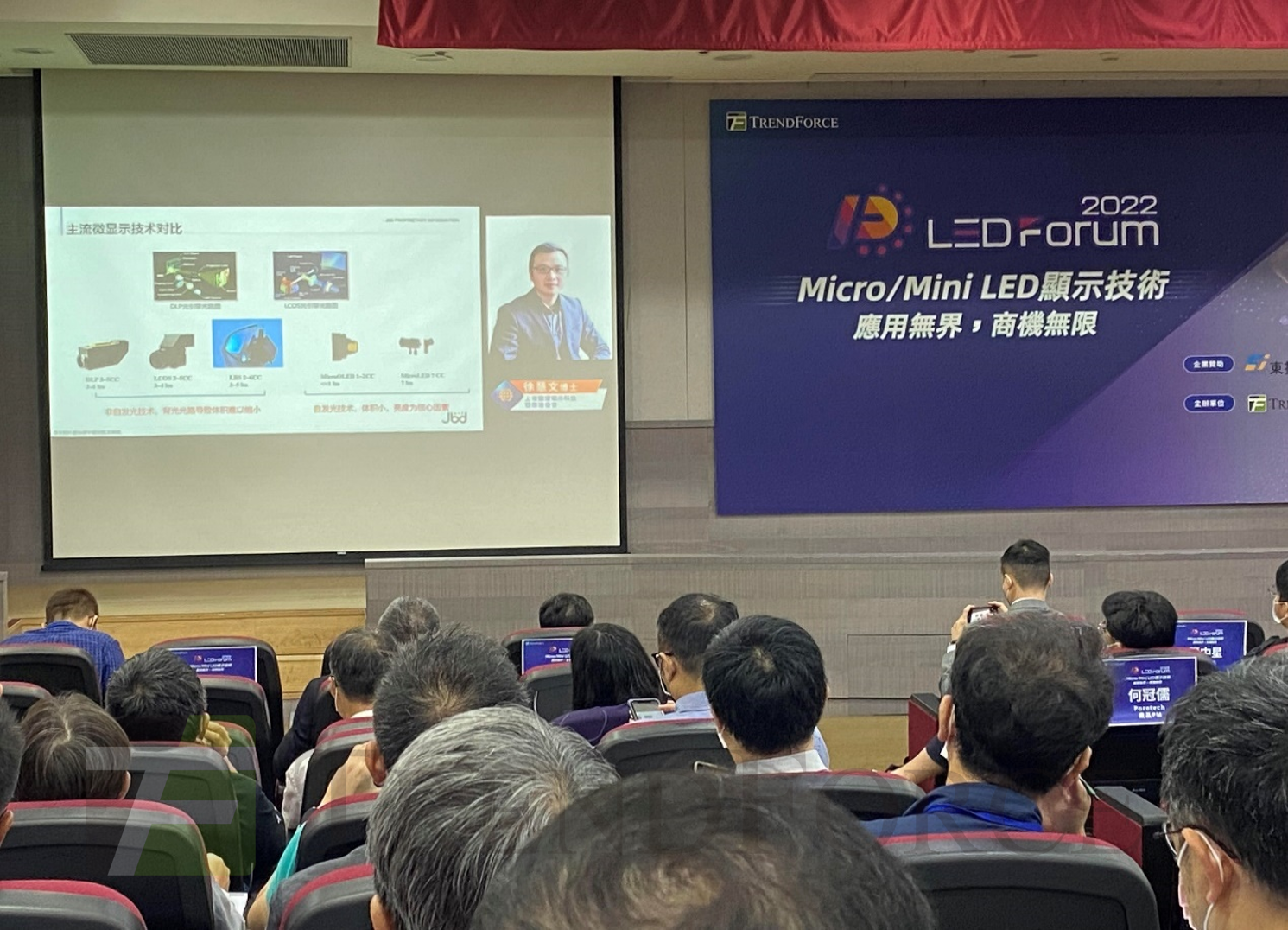
PoroGaN Unleashes Full Potential of GaN in Development of Micro LED Applications
Speaker: Dr. Tongtong Zhu
Founder & CEO / Porotech
Based in the UK, Porotech as a supplier for Micro LED chips has been focusing on AR applications. Dr. Zhu, who delivered his lecture online, shared information about the technologies that his company has developed. Specifically, Porotech has developed a new class of porous GaN semiconductor material that has unique characteristics pertaining to refraction, heat dissipation, electrical conductivity, etc. This material can raise the EQE of red Micro LED chips, thus resolving the issue of obtaining an excellent full-color light source for transparent AR smart glasses.
Currently, GaN is used to make blue and green Micro LED chips, whereas AlInGaP is used to make red Micro LED chips. However, as the size of the red Micro LED chip shrinks, the EQE of the chip drops as well. This also leads to a decline in the lumen of the chip and a lack of uniformity in emission. Again, it has to be emphasized that the new class of porous GaN semiconductor material from Porotech improves the EQE of the red Micro LED chip and resolves the issue of obtaining an excellent full-color light source for Micro LED displays. In 2020, Porotech launched the world’s first commercial InGaN epi-wafer for native red Micro LEDs.
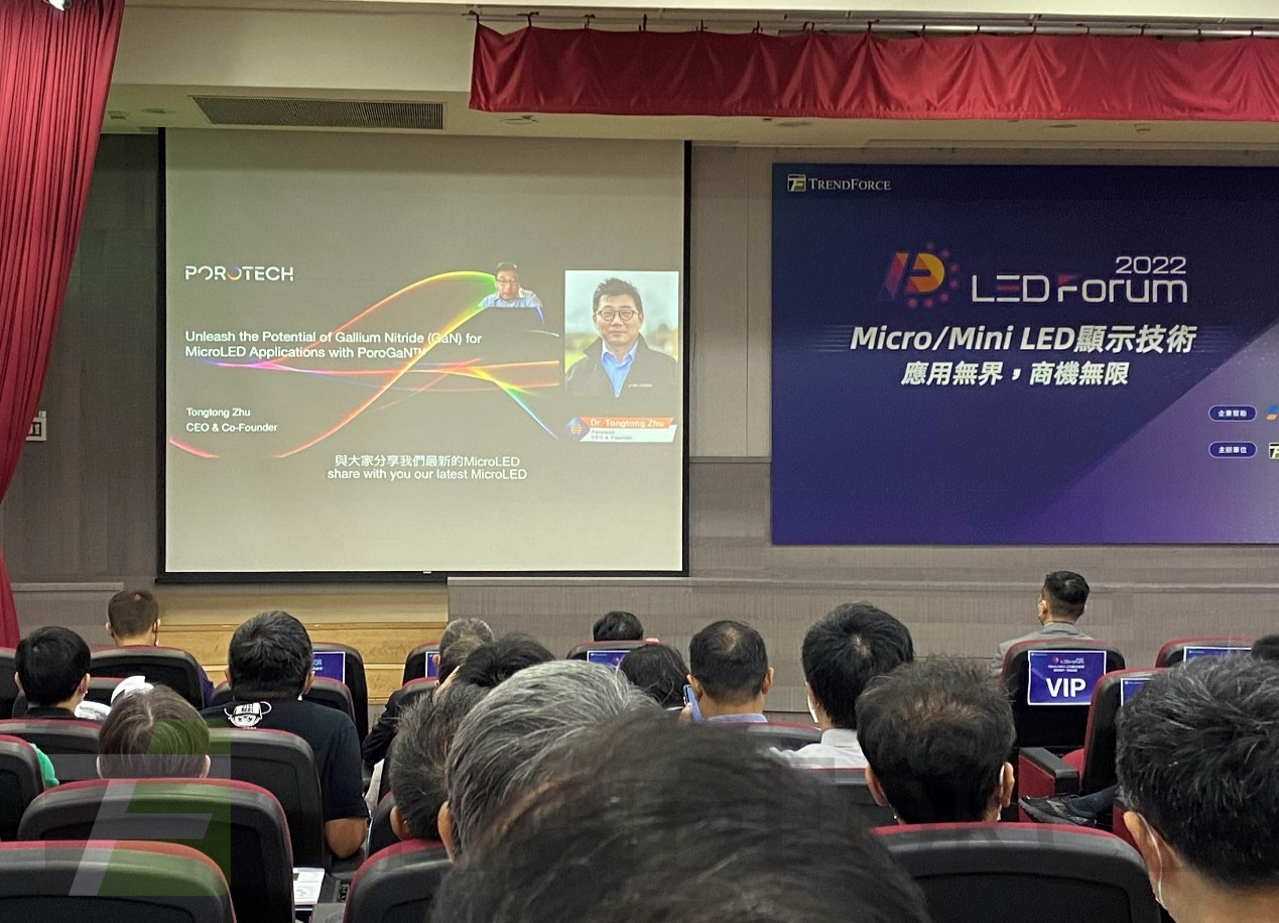
MOCVD Solution for Manufacturing Large Batches of Micro LED Epi-Wafers
Speaker: Alan Tai
General Manager for Taiwan / AIXTRON
Alan Tai from AIXTRON said in the development of the Micro LED manufacturing process and equipment, the ability to produce epi-wafers that deliver wavelength uniformity and a low defect rate at a low cost is the key to reducing the production cost of chips. To that end, AIXTRON offers the Planetary Reactor ®, which is its state-of-the-art MOCVD solution for the mass production of Micro LEDs. The application of this solution to reactor design not only extends the diameter of epi-wafers and but also imposes tight control over wavelength uniformity and defect rate. Moreover, Tai mentioned the AIX G5+C and the AIX 2800G4-TM as the MOCVD systems featuring the Planetary Reactor. He explained how the two systems are able to deposit the epitaxial layers that result in red, green, and blue Micro LEDs. Additionally, Tai specifically addressed AIXTRON’s progress in advancing its MOCVD technology from 6 inches to 8 inches in wafer size without sacrificing the yield rate or the performance of the Micro LED chip.
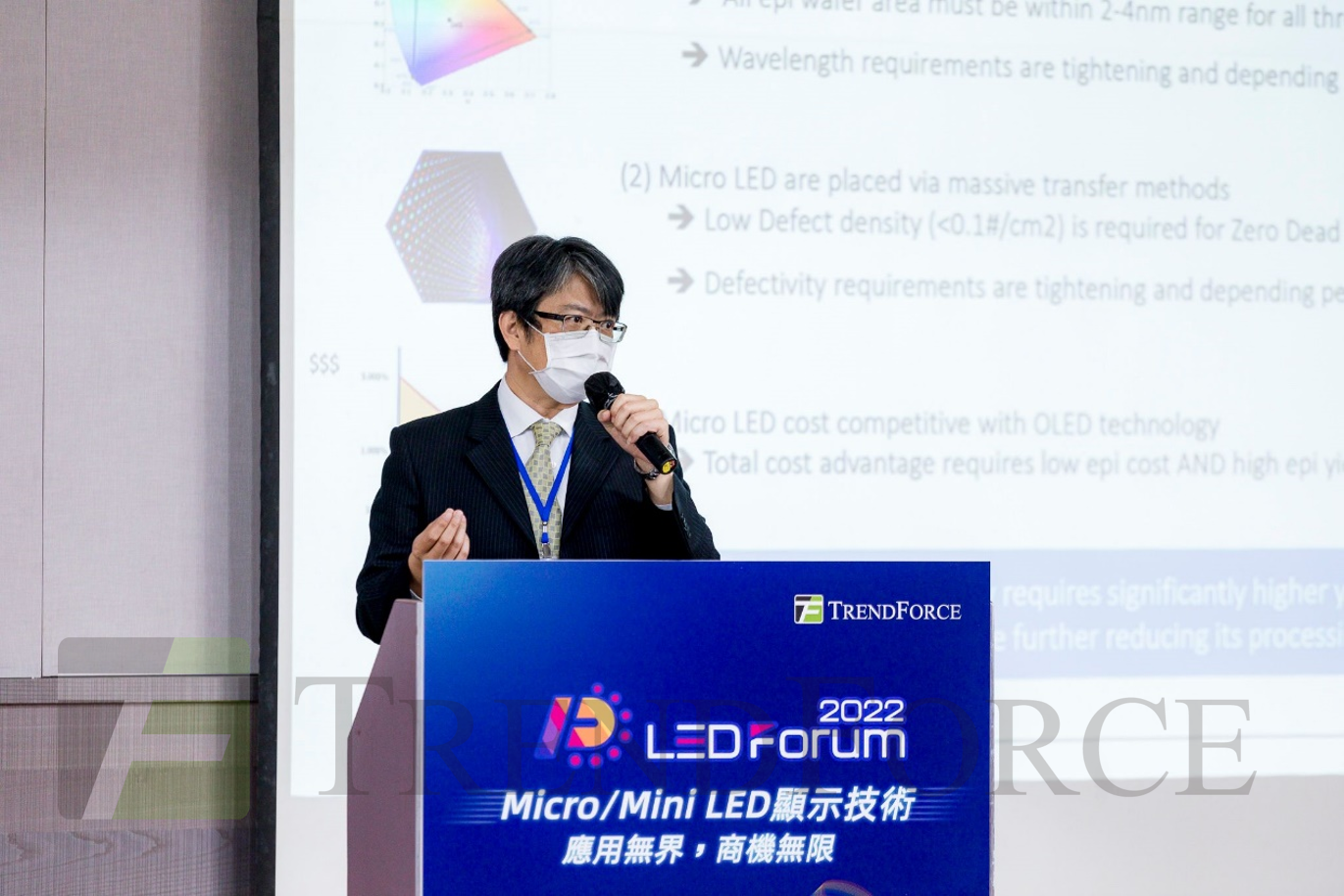
Large-Sized Micro LED Displays for Metaverse
Speaker: Kerry Huang
Deputy Director of Technology Marketing Department / Macroblock
Kerry Huang from Macroblock said with the COVID-19 pandemic continuing to be a serious threat since its emergence in 2019, on-location shooting is still limited for many video productions, and the demand for virtual production sets has risen significantly. Large-sized LED displays featuring curved or straight-edge screens can create a deeply immersive visual experience by serving as backgrounds. In fact, there is an “immersion coefficient” to quantify such effect produced by a display system. If the coefficient is greater than 0.3438, then the display system is at a very high performance level with respect to creating a “real-world” environment. Also, using a virtual production set for an XR video shoot as an example, Huang pointed to Macroblock’s latest solutions that are essential for a large-sized and curved Micro LED display. Specifically, the company has developed the MBI2564 driver IC and the complementing LED display module featuring a pixel pitch of 1.875mm. For the large-sized Micro LED display, Macroblock’s solutions are able dramatically raise its specifications and performance: a 16-bit greyscale, a maximum refresh rate of 7680Hz, and a framerate of 120FPS. With this kind of support, video cameras can shoot at high speeds with ease. At the same time, image colors are reproduced at the fullest fidelity while problems such as ghosting effects caused by time lags are eliminated.
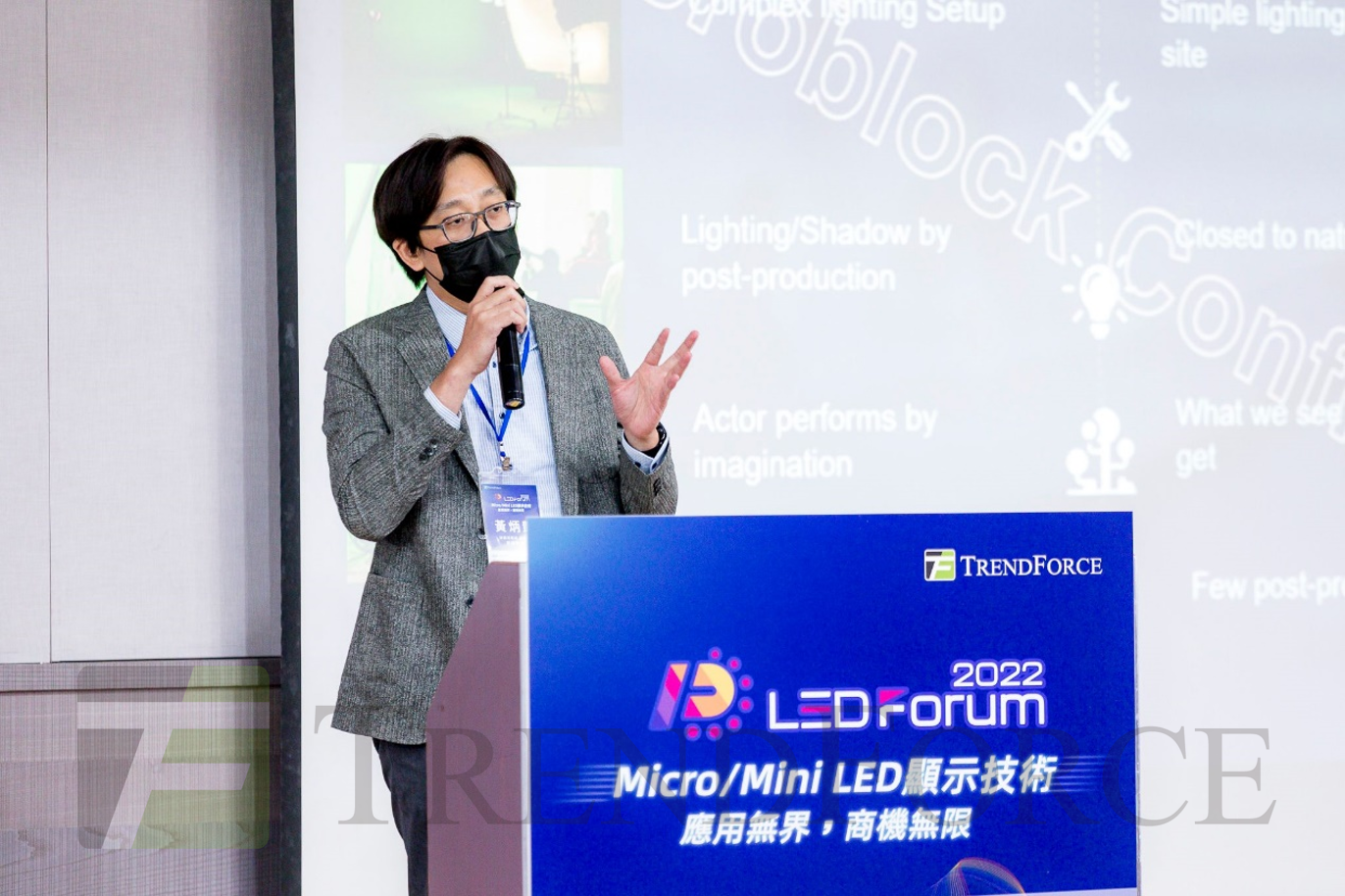
(Author: Simon / TrendForce)


















